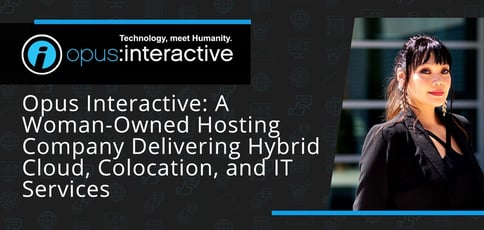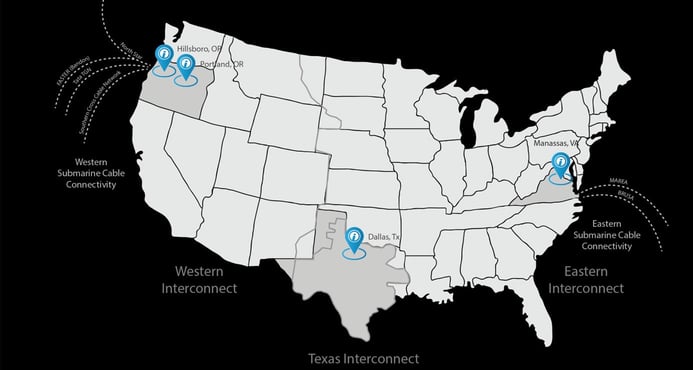
TL; DR: Opus Interactive, based in Portland, has provided customers with colocation, cloud, and managed IT services for 25 years. The woman-owned company focuses on securing mission-critical workloads through hybrid cloud solutions run out of Tier III datacenters in Oregon, Texas, and Virginia. With a continuous focus on innovation, including the strategic use of automation, Opus Interactive is now building upon its hard-earned reputation for state-of-the-art technology and excellent customer service.
Between the deadly pandemic, a global movement for racial justice, and raging wildfires, 2020 was an eventful year. So eventful, in fact, that many are comparing it to the social and political chaos of 1968.
That year — which many look back on as the most tumultuous in American history — was marked by its own highly divisive presidential election, flu pandemic (the H3N2 virus), police brutality protests, and environmental crises.
But despite the similarities, there’s one striking difference: 2020 was set against the backdrop of advanced web technologies, while in 1968, the internet was still a prototype.
In the 60s, Americans turned to the television to cope with a year of uncertainty. Today, we’re using cloud-based technologies and other transformative solutions to manage the pressures of rapid cultural change. And there’s no greater proof of this trend than the fast-growing tech companies that have emerged from 2020 stronger than ever before.
“Collectively, we had grown about 30% year over year since 2012, but last year we grew 50%,” said Shannon Hulbert, CEO of the hosting company Opus Interactive. “Much of that growth was in the colocation space. With people working from home, businesses started shifting on-premises infrastructure to purpose-built facilities.”

We caught up with Shannon Hulbert, CEO, to see how Opus Interactive is helping customers navigate a new cloud-based reality.
Shannon told us she’s also seen an uptick in businesses turning to cloud-based architecture powered by datacenters in diverse geographies and energy grids. Opus Interactive uses such resources for security and resiliency purposes — they protect mission-critical workloads should an environmental or human-made disaster take down a specific location.
“Our facilities are carefully selected based on energy efficiency, security, and reliable connectivity to ensure optimum workload performance,” Shannon said. “We want to make sure you never have downtime.”
Humble Beginnings in 1996 as an IT Department
Opus Interactive’s roots go back to 1996 when the group served as an IT department within a Portland ad agency. There, it provided everything from design and development to hosting and ecommerce solutions.
The department was an early player in the managed hosting and cloud space. It started a virtualization framework in 2003 before officially launching a cloud service in 2005. After significant growth, the department decided to part ways with the ad agency in 2008, and Opus Interactive was born.
When we last checked in with Opus Interactive in 2018, the company had recently expanded into Manassas, Virginia, to serve the East Coast market. Today, the company is continuing to focus on providing cloud hosting, colocation, and managed services out of Tier III datacenters in Oregon, Texas, and Virginia.
These facilities offer multiple methods of authentication, access, control, and surveillance, providing peace of mind to businesses undergoing digital transformations and moving to hybrid hosting environments. The company’s Backup-as-a-Service (BaaS) and Disaster-Recovery-as-a-Service (DRaaS) offerings provide further protection.
“Going into 2020, we were having a lot of conversations with customers considering modernization through the cloud,” Shannon said. “Then COVID came along and you saw the entire world shift to cloud-based technologies. It’s been a wild ride.”
Shannon said the new normal in cloud computing is here to stay. Moving forward, Opus Interactive will continue helping customers adapt to fundamentally changed workplaces and operations.
“Many organizations needed to migrate very quickly into cloud-based workloads last year, and they did so with the first thing available — the public cloud,” she said. “Now, they’re looking for more customized solutions in terms of security, compliance, and performance.”
Hybrid Cloud Strategies for Mission-Critical Workloads
Opus Interactive’s client base resides mainly in the technology, finance, government, and healthcare fields, all of which have unique compliance and security requirements. That’s why the company has been a member of VMware and HPE partnership programs since 2005 and is FedRAMP, HIPAA, PCI-DSS, and SSAE 18 SOC 2 Type II audited.
“We are enabling hybrid cloud strategies for mission-critical workloads,” Shannon said. “About 75% of our customer workloads are in technology and healthcare, so we have processes and policies around compliance and security baked into our DNA. And we shine the most when supporting workloads that absolutely cannot go down.”
Opus Interactive provides hosting environments that balance privacy and security while meeting customers’ financial and compliance goals. The company works to ensure efficient workload distribution through a mix of public cloud, private cloud, and on-premises environments tailored to each sector.

The company’s high-quality datacenters span three states.
On the government side, for example, Opus Interactive offers OpusGov (OG). The private cloud and Infrastructure-as-a-Service (IaaS) solution enables agencies to optimize, store, process, and transfer mission-critical workloads reliably and securely. These solutions are housed in facilities with high levels of controls under the Federal Information Security Management Act (FISMA).
Opus Interactive also works to understand healthcare organizations’ specific needs and build out appropriate hybrid hosting solutions with monitoring and management capabilities. This includes the robust security needed to protect patient data and support innovative use cases in telehealth technology, wearable IoT solutions, and electronic health records.
A Culture of Continuous Innovation
Shannon told us that Opus Interactive’s evolution over the years has been the direct result of using customer feedback to identify gaps in the marketplace. The technique has taken the group from an internal IT department to a colocation company and now a provider of complex hybrid cloud hosting services.
“We are where we are now because we developed a culture of innovation over 25 years,” she said. “We continue to anticipate what’s next based on where we see demand. Currently, that means navigating complexity; helping customers get as much visibility as possible while streamlining operations through automation.”
Opus Interactive’s tagline — Technology, meet Humanity — reflects the company’s dedication to delivering hands-on support. The company prides itself on listening to customers’ business missions and tailoring solutions around them.
This extends to the Opus Interactive Executive Leadership Team, which is made up of Shannon along with Eric Hulbert and Brady Wilson.
“Eric and Brady have been around since the dawn of Opus time,” Shannon said. “They set the standard for who we are and how we operate as an organization. To this day, if you send Eric an email, you’re going to get a response right away. Brady, who builds the solutions, is the same way, always looking to make everything that much better for customers. It’s always about the customer.”
Opus Interactive has big plans for 2021. In February, it introduced a DevOps Division within the company. The new structure is designed to expand automation and optimize cloud solutions with monthly deployments.
“We’re investing in the innovation and expertise to become better, faster, and more cost-effective in managing increasingly complex needs,” Shannon said. “This includes incorporating automation to accelerate continuous innovation.”
HostingAdvice.com is a free online resource that offers valuable content and comparison services to users. To keep this resource 100% free, we receive compensation from many of the offers listed on the site. Along with key review factors, this compensation may impact how and where products appear across the site (including, for example, the order in which they appear). HostingAdvice.com does not include the entire universe of available offers. Editorial opinions expressed on the site are strictly our own and are not provided, endorsed, or approved by advertisers.
Our site is committed to publishing independent, accurate content guided by strict editorial guidelines. Before articles and reviews are published on our site, they undergo a thorough review process performed by a team of independent editors and subject-matter experts to ensure the content’s accuracy, timeliness, and impartiality. Our editorial team is separate and independent of our site’s advertisers, and the opinions they express on our site are their own. To read more about our team members and their editorial backgrounds, please visit our site’s About page.

